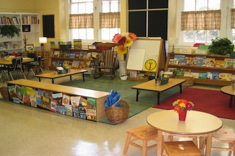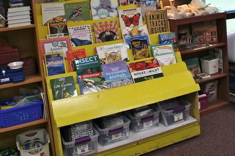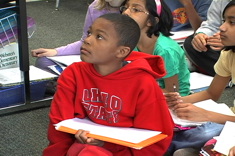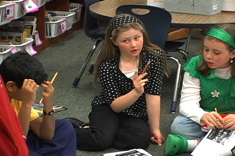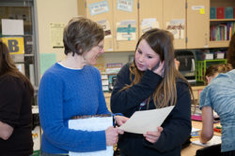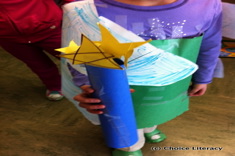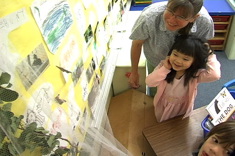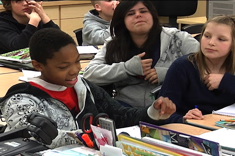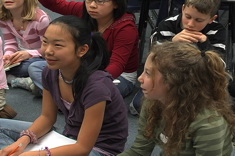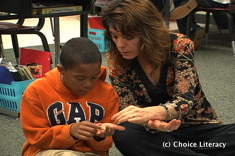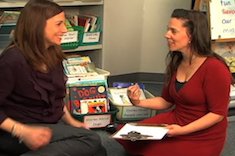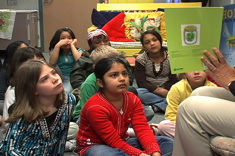Talking and Listening
Listening and speaking—it's the art at the heart of literacy workshops. But there is also a science to how these skills are taught and learned. These resources will show you how to build communication skills in your classroom and school communities.
Latest Content
Rumor Has It
Lisa Koch says we should get our students to start some rumors — about characters, that is.
Teacher Language and Listening with Ellin Keene (PODCAST)
In this podcast, Ellin Keene shares her thinking about linking oral language and literacy development.
Oral Language and Understanding with Ellin Keene (PODCAST)
In this podcast, Ellin Keene poses important questions to herself about true understanding and its relationship to language in the classroom.
Evocative Coaching in Action (PODCAST)
In this podcast, Bob Tschannen-Moran uses the strategy of imaginative listening to process an unsettling interaction Heather Rader had with a colleague.
A Seating Arrangement that Empowers: The Conversation Circle
Ann Marie Corgill explains why a circle arrangement for middle school reading and writing workshop share sessions is vital for helping students focus and respond thoughtfully to peers.
Can I Quote You on That?: Capturing Classroom Conversation
Here's a fun notetaking strategy to try. Ellie Gilbert records snippets of conversation from Katie Doherty's students, and then uses them in a debrief session to discuss student strengths, needs, and next steps.
Stopping and Jotting
How can we be sure the writing tasks we ask of students are meaningful? Jennifer Jones looks at the issues of authenticity and control when it comes to assigning writing connected to reading in workshops.
Fact of the Day
Do you have fact hunters in your room? Andrea Smith legitimizes and celebrates these collectors and brings a new level of nonfiction awareness to her classroom.
Keeping It Real for Students: Never Underestimate the Power of Reflection
Melanie Quinn consoles a teacher who is recovering from a disastrous lesson captured on video, and shows the power of a “do-over” for both teachers and students.
When You Hate the Book
Abandoning a text isn't always an option (in school or life). Clare Landrigan considers her own experience as a reader and applies those lessons to the classroom.
Learning from Master Teachers: It’s the Process, Not the Content (Part I)
Have you ever wondered why lessons you attempt to imitate from master teachers you’ve seen on videos often go poorly? Franki Sibberson asked herself this question after trying a minilesson she viewed from Debbie Miller. She discovered it’s what comes before the lesson that matters more than what’s in the lesson.
Communicating with the Y Chromosome
Heather Rader finds herself coaching a male teacher who is part of a male teaching team, and gets a lesson herself in gender communication patterns.
Current and Cocoa: Mixing Social Studies and Literacy
Current and Cocoa is a fun routine for integrating social studies, literacy, and conversation in classrooms. Heather Rader describes how the weekly activity builds community and fosters awareness of news events.
A More Literate Show and Tell
Tammy Mulligan and Clare Landrigan work with a kindergarten teacher to integrate literacy skill development into this favorite routine of young children.
What’s Good for the Goslings is Good for the Geese: Parallels Between Scaffolding Student Learning and Scaffolding Staff Development
Terry Thompson considers the concept of “scaffolding” for both student learning and professional development.
Language in the Classroom: Using a Recorder as a Teaching Resource
Ruth Shagoury provides tips and strategies for analyzing language in the classroom.
From Hearing to Listening
Jennifer Jones finds there is a world of difference between hearing and genuinely listening to the teachers who come to her for support. She shares some simple questions she uses at the start of professional conversations to ensure she is providing the right kind of response.
Readers’ Theater Revisited
Katie DiCesare becomes reacquainted with an old curricular friend. But in trying reader’s theater again in her primary classroom, she finds ways to streamline the process and foster more independence in students.
Classroom Gifts from Carlos: Helping Young Students Learn Academic Language and Routines
It can be especially difficult for young children from impoverished homes to understand academic language and the demands of school. Andie Cunningham observes the sophisticated ways a preschool teacher helps her students adapt with invitational language.
Coaching Codes
A code of conduct is created to outline the standards and rules of behavior that guide an organization. Effective codes spell out “unspoken rules” as well, so that everyone can be successful. Heather Rader thinks through what a useful code for coaches might look like.
Seven Minutes of Listening
What can we learn by listening closely to children? Plenty — Andie Cunningham shares insights from seven minutes with a young English language learner.
Language Patterns: Reflecting with Transcripts and Wordle
If you are familiar with Wordle, you already know it is a great free tool on the web for creating “word clouds” – visual representations of language. Heather Rader uses Wordle in her literacy coaching to give new and veteran teachers a succinct and powerful visual representation of their teaching language.
Uncovering Reading Behaviors
Teachers value the assessment of student skills and needs that come from close observation in classrooms, but may not know how to focus those observations. Ruth Shagoury documents some of those behaviors that put students on the path of becoming accomplished independent readers in a middle school classroom.
Helping Students Deal with Distractions
Clare Landrigan and Tammy Mulligan offer lesson suggestions for helping students self-monitor and deal with distractions during literacy workshops.
Writing Do-Overs: ERPs in the Classroom
ERP. The sound can't help but make you grin. It's Heather Rader's acronym for Explicit Revision for Peers, a series of one-minute kinesthetic writing routines to help students learn how to help each other kindly during writer's workshop.
The Power of Wonder Questions
Andrea Smith writes about how she uses wonder questions in her science curiculum.
You Get What You Ask For: The Art of Debriefing
Heather Rader explores the fine art of asking specific questions during coaching debrief sessions.
Books That Invite Thoughtful Conversation in Grades K-2
Nothing beats an engaging and fun text to spark conversations among young children. Here are some suggestions of terrific read-alouds to get the chatter started in classrooms.
A Coach’s Perspective: Is Sarcasm in Style This Season?
When is sarcasm appropriate in classrooms? Never, yet more is popping up all the time in schools, even from teachers. Here is some advice for dealing with sarcasm.
Sarcasm Is a Useful Teaching Tool — NOT
How does sarcasm hurt students? Heather Rader counts the ways.
Browse Content By
Type
Category
- Assessment Tools
- Big Fresh Archives
- Booklists
- Choice Numeracy
- Classroom Design
- Common Core
- Community Building
- Conferring
- Content Literacy
- Digital Literacy
- English Language Learners
- Equity
- Family Relations
- Free Samples
- Guiding Groups
- Leadership
- Literacy Coaches
- Mentor Texts
- Minilessons
- New Teacher Mentors
- Podcasts
- Poetry
- Quote Collections
- Reading Strategies
- Self Care
- Struggling and Striving Learners
- Talking and Listening
- Teacher Study Groups
- Teaching Reading
- Teaching Writing
- Word Study and Vocabulary
Author
- Melissa Quimby
- Nawal Qarooni
- Gwen Blumberg
- Julie Cox
- The Lead Learners
- Hannah Tills
- Josie Stewart
- Ruth Metcalfe
- Mallory Messenger
- Becca Burk
- Jodie Bailey
- Vivian Chen
- Mary Brower
- Tiffany Abbott Fuller
- Stephanie Affinito
- Ruth Ayres
- Leigh Anne Eck
- Heather Fisher
- Shari Frost
- Julie Johnson
- Suzy Kaback
- Gigi McAllister
- Shirl McPhillips
- Melanie Meehan
- Cathy Mere
- Debbie Miller
- Tara Barnett and Kate Mills
- Tammy Mulligan
- Dana Murphy
- Bitsy Parks
- David Pittman
- Brenda Power
- Heather Rader
- Matt Renwick
- Mandy Robek
- Christy Rush-Levine
- Gretchen Schroeder
- Jen Schwanke
- Brian Sepe
- Katherine Sokolowski
- Stella Villalba
- Jennifer Vincent
Grade Level
Choice Literacy Membership
Articles
Get full access to all Choice Literacy article content
Videos
Get full access to all Choice Literacy video content
Courses
Access Choice Literacy course curriculum and training





